《短语动词和动词短语》
英语中常见的动词短语和短语动词的区别和用法
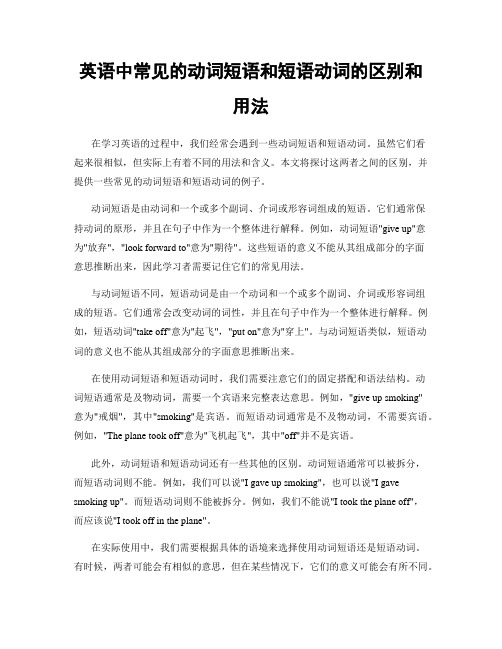
英语中常见的动词短语和短语动词的区别和用法在学习英语的过程中,我们经常会遇到一些动词短语和短语动词。
虽然它们看起来很相似,但实际上有着不同的用法和含义。
本文将探讨这两者之间的区别,并提供一些常见的动词短语和短语动词的例子。
动词短语是由动词和一个或多个副词、介词或形容词组成的短语。
它们通常保持动词的原形,并且在句子中作为一个整体进行解释。
例如,动词短语"give up"意为"放弃","look forward to"意为"期待"。
这些短语的意义不能从其组成部分的字面意思推断出来,因此学习者需要记住它们的常见用法。
与动词短语不同,短语动词是由一个动词和一个或多个副词、介词或形容词组成的短语。
它们通常会改变动词的词性,并且在句子中作为一个整体进行解释。
例如,短语动词"take off"意为"起飞","put on"意为"穿上"。
与动词短语类似,短语动词的意义也不能从其组成部分的字面意思推断出来。
在使用动词短语和短语动词时,我们需要注意它们的固定搭配和语法结构。
动词短语通常是及物动词,需要一个宾语来完整表达意思。
例如,"give up smoking"意为"戒烟",其中"smoking"是宾语。
而短语动词通常是不及物动词,不需要宾语。
例如,"The plane took off"意为"飞机起飞",其中"off"并不是宾语。
此外,动词短语和短语动词还有一些其他的区别。
动词短语通常可以被拆分,而短语动词则不能。
例如,我们可以说"I gave up smoking",也可以说"I gave smoking up"。
动词和动词短语(最详细)

三、常见动词(短语)用法辨析
单词 spend pay cost
主语
搭配
含义
人 人
物 it
sb. spend+时间、金钱 +(in)doing/on sth.
某人花费……(做)某 事 某人花费金钱在……上 某物花费某人……(金 钱) 某人花费……做某事
sb. pay+金钱 for sth.
sth. cost(+人)+金钱 it takes(+人)+时间、 to do sth.
双写该辅音字母, 再加-ed
live- lived, lived carry-carried, carried
stop- stopped, stopped
② 不规则动词的变化。(见九年级英语下册不规则动词表)
3、动词的现在分词的构成:
动词特征 一般动词 变 化 例 词
直接加-ing
looklooking watchwatching
表示“带走、拿走”,指从说话处带到别处。
表示“搬、带走、携带”,不表示动作的方向,强调随身 携带。 表示“去拿来”,指动作往返的过程。
carry fetch
单词
borrow
含义
搭配
间为“借入”,为终止性动 borrow sth. from sb. 词。表示主语“借入”某物。 间为“借出”,为终止性动 lend sth. to sb. 词。表示主语“借出”某物。 间为“保存,借”,为持续 性动词。表示“长时间地借”
我正在找我的笔。(现在进行时) I’m looking for my pen. 这些杯子是中国制造的。(被动语态) These cups are made in China.
动词和动词短语

动词和动词短语一、系动词1.表示人或事物特征和状态的系动词,如smell,live,look,sound,feel,seem,appear等。
例如:The actor looked his part.那个演员看上去和他演的角色很相称。
He appears fl normal person.他看来是一个正常人。
2.表示状态的变化,如go,grow,run,turn,become,wash,get,turn OUt,come等。
例如:His dream has come true.他的梦想成真了。
The river went dry.河流干涸了。
3.表示某种状态的持续或延续,如last,stand,lie,keep,stay,continue,hold等。
例如:He stayed young.他依然年轻。
He told me to keep calm under all circumstances.他告诉我在任何情况下都要保持镇静。
注意:常用系动词及与之搭配的形容词:①feel:sorry,lonely,proud,shy。
happy等。
②get:late,fat,dark,worse,angry,well等。
③go:hungry,bad,lame,broken,mad,blind等。
④grow:worse,calm,cold,old,thin,big,fat,dark 等。
⑤keep:calm,fine,quiet,warm,happy等。
⑥look:strong,tired,fit,nervous,friendly,pretty,excellent等。
⑦remain:single,unmarried,calm,open,active,silent 等。
⑧prove:false,correct,easy,difficult,useful等。
⑨turn:yellow,grey,pale,red,black,green,cold等。
英语中动词短语与短语动词的区别
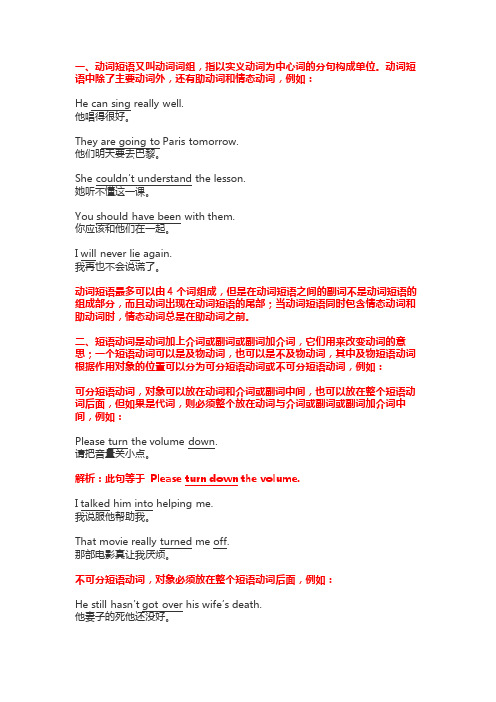
一、动词短语又叫动词词组,指以实义动词为中心词的分句构成单位。
动词短语中除了主要动词外,还有助动词和情态动词,例如:He can sing really well.他唱得很好。
They are going to Paris tomorrow.他们明天要去巴黎。
She couldn’t understand the lesson.她听不懂这一课。
You should have been with them.你应该和他们在一起。
I will never lie again.我再也不会说谎了。
动词短语最多可以由4个词组成,但是在动词短语之间的副词不是动词短语的组成部分,而且动词出现在动词短语的尾部;当动词短语同时包含情态动词和助动词时,情态动词总是在助动词之前。
二、短语动词是动词加上介词或副词或副词加介词,它们用来改变动词的意思;一个短语动词可以是及物动词,也可以是不及物动词,其中及物短语动词根据作用对象的位置可以分为可分短语动词或不可分短语动词,例如:可分短语动词,对象可以放在动词和介词或副词中间,也可以放在整个短语动词后面,但如果是代词,则必须整个放在动词与介词或副词或副词加介词中间,例如:Please turn the volume down.请把音量关小点。
解析:此句等于Please turn down the volume.I talked him into helping me.我说服他帮助我。
That movie really turned me off.那部电影真让我厌烦。
不可分短语动词,对象必须放在整个短语动词后面,例如:He still hasn’t got over his wife’s death.他妻子的死他还没好。
I don’t think she takes after her mother.我认为她不喜欢她母亲。
No one tried to break up the fight.没有人试图阻止这场战斗。
常见的动词短语及例句
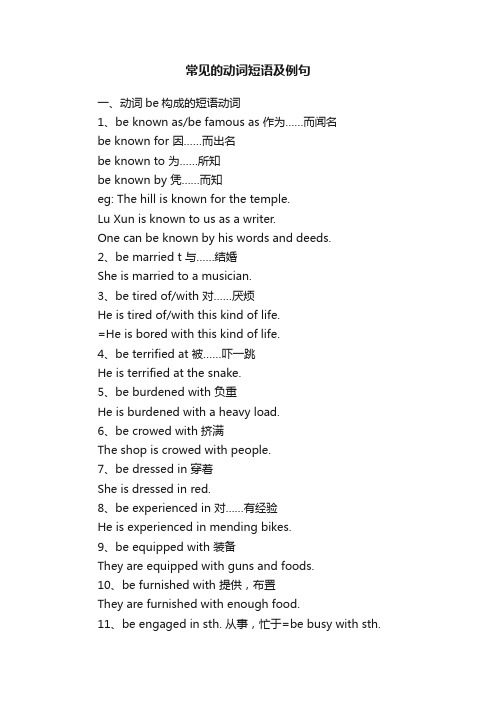
常见的动词短语及例句一、动词be构成的短语动词1、be known as/be famous as 作为……而闻名be known for 因……而出名be known to 为……所知be known by 凭……而知eg: The hill is known for the temple.Lu Xun is known to us as a writer.One can be known by his words and deeds.2、be married t 与……结婚She is married to a musician.3、be tired of/with 对……厌烦He is tired of/with this kind of life.=He is bored with this kind of life.4、be terrified at 被……吓一跳He is terrified at the snake.5、be burdened with 负重He is burdened with a heavy load.6、be crowed with 挤满The shop is crowed with people.7、be dressed in 穿着She is dressed in red.8、be experienced in 对……有经验He is experienced in mending bikes.9、be equipped with 装备They are equipped with guns and foods.10、be furnished with 提供,布置They are furnished with enough food.11、be engaged in sth. 从事,忙于=be busy with sth.He has been engaged in writing novels.12、be engaged to 与……订婚My daughter is engaged to a nice doctor.13、be about to do sth. 正要做……I was just about to go swimming when our guide saw me and stop me.14、be fit to do/be fit for 胜任,适合于He is fit to do this work.15、be worth doing 值得做……The film is worth seeing again16、be proud of 以……为骄傲I am proud of being a Chinese.17、be used to sth./ doing sth. 习惯于……My grandpa is not used to living in the noisy city.18、be content with 对……感到满意You should be content with what you are.19、be content to do sth./with 甘愿于……,满足于……I am content with your work this time.20、be up to 应由……,轮到……It is up to her to answer the question.21、be meant/intended for 打算给,打算用作Is this valuable painting meant for me?22、be connected with 与……有联系He was also connected with the government.23、be crazy about 对……狂热Many young people are crazy about music.二、动词break构成的短语1、break out 爆发The Anti-Japanese War broke out in 19372、break in 打断,闯入Two robbers broke in and robbed the bank of a lot of money.3、break into 闯入,破门而入They broke into the bedroom and found the man lying on the floor.4、break away from 脱离Lincoln said it was not fight for the south to break away from the union.5、break down (机器、车辆)坏了;失败了;摧毁;分解We are sorry to arrive late, but the car broke down.6、break through 突破The marchers broke through the line of the police.7、break off 折断;中断;断绝Let us break off for half an hour and have some tea.8、break up 驱散;拆散The police broke up the crowd.三、动词carry构成的短语动词1、carry on 进行He had learned enough English to carry on a conversation.2、carry out 执行;进行They were carrying out an important experiment.3、carry away 拿走Please carry these desks away.4、carry off 夺走;拿走Some unknown man carried off the prize.四、动词call构成的短语动词1、call on 拜访某人;号召We will call on Mr. Li tomorrow.We are called on to help those in trouble.2、call at 拜访某地I called at your office yesterday, but you were not in.3、call for 需要;要求;邀约人;取某物Success called for hard work.call for a doctor 去请医生4、call in 请来;收回Mother is badly ill, so call in a doctor at once.5、call up 打电话;征召;回想起I called T om up and told him the news.In most countries men are called up at the age of 18.As I grew up in a small town at the foot of a mountain, the visit to the village called up scenes of my childhood.五、动词catch, hold 构成的短语动词1、catch/take/get hold of sth. 抓住某物Catch/Get/T ake hold of the rope, and I will pull you up.2、catch up with 赶上Work hard and I am sure you are able to catch up with others in class.3、catch fire 着火;烧着Last night a big building caught fire.4、catch sight of 发现;看到When the mice caught sight of the cat, the mice run away as quickly as possible.5、hold up 举起;阻滞(交通);耽搁He held up one of his fingers and showed it to the class.In the rush hour the traffic is hold up.6、hold back 阻止;控制We must hold them back from fighting.7、hold out 坚持;拿出We must hold out until helps comes.六、动词come构成的动词短语1、come into……进入……come into being (事物、局面)产生;形成The custom came into being long long ago.2、come along 过来;快点Come along! It is nearly 8.3、come out 出来;出版How did the printing come out?4、come true 实现I am sure your dream will come true one day.5、come back to life 苏醒过来When the wounded soldier came back to life, he found himself in hospital.6、come to the point 说到要点;触及问题实质7、come about 发生;造成The event came about as he had predicted it.8、come across 偶然碰见;遇见=run acrossY ou are the most beautiful woman I have ever come across.9、come to an end 结束Y ou duties here have come to an end.10、come to light 为人所知;显露The robbery did not come to light until the next day.11、come up with 提出;想出He came up with a new suggestion.七、动词do构成的短语动词1、do well in 在某方面做得好My cousin is a sailor and he is doing very well in the navy.2、do good to 对……有好处Doing morning exercises will do good to your health.3、do harm to 对……有坏处T oo much noise does harm to our health.4、do with 处理What did you do with our goods?5、do sb. a favour 帮某人的忙Will you de me a favour to carry it upstairs?6、do up 系纽扣;梳理Look, your bottom is not done up.八、动词get构成的动词短语1、get in touch with 同……取得联系2、get up 起床He gets up very early everyday.3、get back 回来;取回I will get back next weekend.4、get on 上车Y ou should not get on the bus until it has stopped completely.5、get over 克服;度过Y ou will soon get over these difficulties.6、get off 下车The bus stopped and the passengers got off.7、get together 相聚We should go to a restaurant to get together.8、get on/along well with 与……相处融洽I am getting on well with my classmates.9、get into 进入;陷入Do not get into the habit of smoking.10、get into trouble 陷入麻烦11、get in a word 插话12、get rid of 除掉We are doing our best to get rid of pollution.13、get through 通过;接通;完成;经历I tried to phone you but I could not get through.14、get to 到达He had to get to the other side of street to attend a meeting.15、get about/around/round 传开;传出去The news of the disaster soon get about.16、get across 使理解The teacher tried to explain the problem, but the explanation did not get across to the class.17、get away 离开I was in a meeting and could not get away.18、get down to (doing) sth. 安心做;开始认真于Y ou must get down to your studies this year.九、动词give构成的短语1、give up 放弃I persuaded him to give up the foolish plan.2、give in 屈服;投降He would not give in to the enemy.3、give out 用完;耗尽Our food and water will give out soon.4、get out of 从……出来;摆脱He got out of debt.5、give away 分发;泄露;捐赠He gave away most of his fortune to the poor work.6、give off 放出This engine gives off lots of smoke and steam.7、give back 归还;恢复Living here has given me back my health.十、动词go构成的短语动词1、go ahead 继续;干吧He went ahead with the work and got it done.2、go by (时间)过去;经过(地点)Do not let the good chance go by.3、go out (灯、火)熄灭When they arrived, the fire had gone out.4、go on (doing) sth. 继续做某事Please go on with your work.5、go on to do sth. 接着做另外的事He went on to watch TV after he had finished his homework.6、go over 检查;复习When I came into the classroom, our teacher isgoing over our homework.7、go through 完成;通过;经过,仔细检查During the night the computers go through the information.8、go all about 竭尽全力They went all out to build the dam.9、go about 开始着手;到处走动;传开How does one go about getting the information? 10、go against 违背They are going against our wishes.11、go back 回家;追溯This festival goes back to Roman times.12、go for 运用于;应用于The medicine went for nothing.13、go in 参加;爱好She went in for a singing competition.14、go with 相配I want some shoes to go with these trousers.15、go without 不吃;不喝;不用The poor boy often has to go without supper. 16、go beyond 超过That is going beyond a joke.17、go up 上升;上涨The goods have gone up in quality.18、go down 下降;下沉;降落The moon has gone down.十一、动词have构成的短语动词1、have a word with sb. 和某人有句话说Could you spare a few minutes? I want to have a word with you.2、have words with 争吵They have had words with her about money.3、have (deep) effect on 对……有(深远)影响The book has great effects on his life.4、have difficulty in/find difficulty in/have trouble in 做……有困难We have difficulty in writing the composition.十二、动词knock构成的短语动词1、knock at 敲门;敲窗Y ou should knock at the door before coming in. 2、knock down 撞倒They make sure the cows not knock the youngtrees down or eat the leaves.3、knock off 撞掉下来A child ran into the street and knocked thewoman off her bicycle.4、knock about 连续打击/碰撞;漂泊;闲逛He has knocked about all over Asia.十三、动词keep构成的动词短语1、keep on doing sth. 继续或反复做某事T om kept on doing studying English and using it when he lived in London.2、keep up 坚持Keep up your courage and your will succeed.3、keep up with 跟上She can’t keep up with others.4、keep back 保留;阻止;隐瞒;拒绝She was in deep sorrow, but she kept back her tears.5、keep away from 远离Keep children away from fire.6、keep out of 使……不进入In the ancient time, the Great Wall was built inorder to keep enemy out of country.7、keep one’s word 遵守诺言I am sure your will keep your word.8、keep in touch with 与……保持联系We kept in touch with each other by writing letters.9、keep silent 保持沉默He kept silent about the matter.10、keep/prevent/stop……from doing sth.制止(防止)做某事The heavy rain kept us from going out.11、keep off 使……远离Please keep off the grass.十四、动词look构成的动词短语1、look up抬头;查阅Y ou may look up new word in a dictionary.2、look out 小心Look out! The pan is on fire.3、look into 调查We will further look into the matter.4、look forward to 盼望We look forward to knowing the results of the exam.5、look through 仔细看;浏览Y ou have to look through the papers before you hand them.6、look up to 尊敬Y oung children look up to old people.7、look down upon 瞧不起The days are gone when women were looked down upon.8、look like看起来Y ou look like your father.9、look on……as (=treat/consider/take/think of……as)把……看作He looks on the computer as his friend.10、look after 照顾When I was ill, my mother looked after me.11、look for寻找What are you looking for?十五、动词make构成的短语动词1、make a dive for 向……猛冲The dog made a dive for the bone.2、make an apology to 向……道歉He made an apology to her.3、be made up of 组成Two thirds of the earth’s surface is made up of vast ocean.4、made up 组成;化妆;打扮;补充;弥补;编造Great Britain and Northern Ireland make up the United Kingdom.The whole story is made up.5、make room for 给……腾地方Would you like to make room for the old lady?6、make up one’s mind 下决心I have made up my mind to work harder thanbefore.7、make up for 弥补We must make up for the time wasted before.8、make use of 利用We should make full use of the books in the library.9、make one’s way 排除困难前进After the film ended we made our way out ofcinema.10、make progress 进步With the teacher’s help, I have made muchprogress.11、make repairs 修理They are making repairs in that building.12、make a living 谋生He began to make a living by himself when he wasten.13、make for 走向;前往They set off by car and made the nearest town. 14、make the best of 尽量使用Mother didn’t enjoy his j ob, but she made the bestof it.15、make out 认出;理解We made out a figure in the darkness.16、make it 成功After hard-working, we made it at last.17、make a promise 许诺言Father made a promise to buy me a new computer.十六、动词put构成的短语动词1、put away 放好;收起来Put the books away after reading.2、put down 记下;平息Put down the gentleman’s address.3、put out 扑灭;出版It took the fire-fighters four hours to put out the fire.4、put up 举起;建造;张贴;公布;投宿Many new buildings have been put up in our city.5、put up with 忍受He is prepared to put up with it for the time being.6、put on 穿上;上演;增加We will put on the new play next month.7、put off 延期;拖延The sports meet will be put off because of the bad weather.8、put through 完成;(打电话)把……接通Can you put me through to this number?9、put forward 提出建议;拨快(钟等)The doctor put forward a good suggestion.十七、动词take构成的短语动词1、take up 占据(时间,空间);从事The piano takes up too much space in the room.2、take……out 拿出去。
高考英语词法系列:动词和动词短语
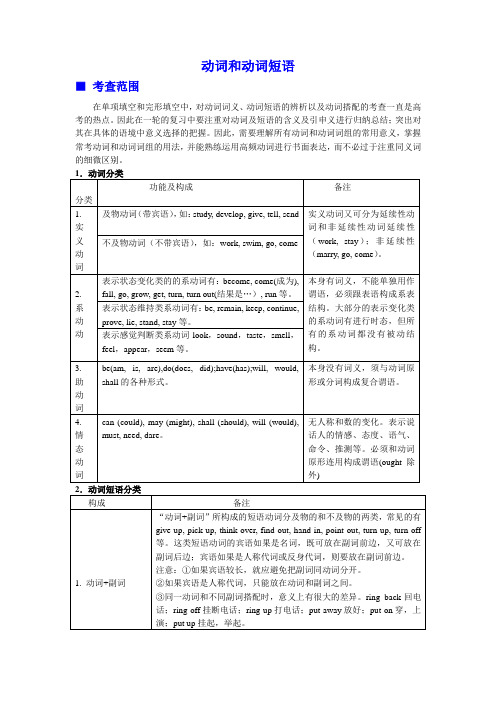
动词和动词短语■考查范围在单项填空和完形填空中,对动词词义、动词短语的辨析以及动词搭配的考查一直是高考的热点。
因此在一轮的复习中要注重对动词及短语的含义及引申义进行归纳总结;突出对其在具体的语境中意义选择的把握。
因此,需要理解所有动词和动词词组的常用意义,掌握常考动词和动词词组的用法,并能熟练运用高频动词进行书面表达,而不必过于注重同义词的细微区别。
■高频考点高考对动词的考查重点集中在实义动词的常见意义和用法,而对助动词的考查较少。
对动词短语的考查重点是第1~3项,而考查第4~6项的情况较少。
高考试题分析■真题探究1.(2010安徽)No matter how low you consider yourself, there is always someone ______you wishing they were that highA. getting rid ofB. getting along withC. Looking up toD. looking down upon【答案与解析】C getting rid of意为“摆脱;去除”;getting along with意为“与……相处;进展”;Looking up to意为“尊敬;敬仰”;looking down upon意为“看不起;轻视”。
句意为“你无论认为自己怎样低下, 总希望有个高尚的人来尊敬你。
”2. (2010全国Ⅰ)The workers ______ the glasses and marked on each box “ This Side Up”A. carriedB. deliveredC. pressedD. packed【答案与解析】D 句意:工人们把玻璃制品包装好并且每个盒子上标记上“此面向上”。
选项为四个意思上毫无关联的动词, 此题考查动词的词义辨析。
carry 译为搬运, deliver译为递送, press译为按, 压, pack译为打包。
动词短语和短语动词的区别
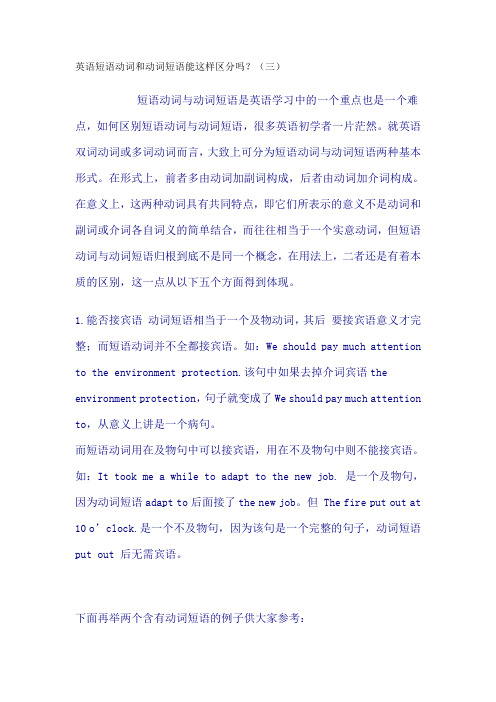
英语短语动词和动词短语能这样区分吗?(三)短语动词与动词短语是英语学习中的一个重点也是一个难点,如何区别短语动词与动词短语,很多英语初学者一片茫然。
就英语双词动词或多词动词而言,大致上可分为短语动词与动词短语两种基本形式。
在形式上,前者多由动词加副词构成,后者由动词加介词构成。
在意义上,这两种动词具有共同特点,即它们所表示的意义不是动词和副词或介词各自词义的简单结合,而往往相当于一个实意动词,但短语动词与动词短语归根到底不是同一个概念,在用法上,二者还是有着本质的区别,这一点从以下五个方面得到体现。
1.能否接宾语动词短语相当于一个及物动词,其后要接宾语意义才完整;而短语动词并不全都接宾语。
如:We should pay much attention to the environment protection.该句中如果去掉介词宾语the environment protection,句子就变成了We should pay much attention to,从意义上讲是一个病句。
而短语动词用在及物句中可以接宾语,用在不及物句中则不能接宾语。
如:It took me a while to adapt to the new job. 是一个及物句,因为动词短语adapt to后面接了the new job。
但 The fire put out at 10 o’clock.是一个不及物句,因为该句是一个完整的句子,动词短语put out 后无需宾语。
下面再举两个含有动词短语的例子供大家参考:(1) I waited for him all day.(2) What does this sigh stand for?典例分析 When he realized the police had spotted him, the man _______ the exit as quickly as possible.A) made off B) made for C) made out D) made up答案B。
动词与动词短语

第四讲动词和动词短语考点一动词的分类1,及物动词:可直接加宾语。
如:do, hate, like, marry, say, tell.2,不及物动词:加适当的介词后再加宾语。
如:come, go, arrive3,助动词:have (has, had),do (did, does)4,可接双宾语的动词如: show, buy, sell, offer, make, teach, award等,其用法为:1,动词+间宾(人)+直宾(物)buy me a book.2,动词+直宾+for(为)+间宾buy a book for me.3,动词+直宾+to(方向)+间宾show the book to me.5, 系动词:be (am, is, are, was, were)除be动词外,还有些动词可以用作连系动词,它们不能单独作谓语,必须与表语(多为形容词)一起构成合成谓语。
【对点演练】一. 单句语法填空,根据汉语提示完成句子。
1.You know how I ____(讨厌)math.2.He _________(进入)the room and shut the door.3.Do you ____(助动词)something to eat?4.He is saving up to buy a house ____(介词) his family.5.He ___(系动词) staying with friends this weekend.答案:1 hate 2came into 3have 4for 5is二. 单句语法改错1.Now I like to the film some.2.Will you go us? Sure!3.Love me as I love you?4.Do not expect him to show kindness for you.5.I will brain you if you don't keep quietly.答案:1去掉to 2 go后面加with 3Love前面加Do,且Love改love 4for改to 5quietly改quiet考点二动词辨析1. 重点掌握某些近义词的辨析如:admit, allow, permit; contain, include; receive, accept; want, wish, hope, expect; stay, remain, keep; discover, uncover等。
动词短语与短语动词 区别

短语动词与动词短语区别区别:英语中短语动词与动词短语是不相同的两个概念。
短语动词是英语习语的一个重要类别,而动词短语是一种自由词组。
从词汇学的角度看,它们分属于两个不同的范畴:词类和短语。
从结构看短语动词是由动词加上小品词生成的,而动词短语则是由转换生成语法学派提出的动词加上其他词类构成的短语结构。
短语动词(Phrasal verb)又称“动词词组”,它们是由一个动词和其它词类在一起构成的固定搭配,即由动词加介词、副词或其他词构成的词组,其作用和动词差不多。
有些短语动词相当于及物动词,有些则相当于不及物动词。
因此我们可以把它们看作一个整体,像一般实义动词一样使用。
不同于介词短语,介词和其他代词或名词搭配形成介词短语。
英语中一些常用动词常可以与某些介词、副词或其他词构成意义不同的习语(idioms)。
这些组合一般只作为一个整体使用,因此被称为短语动词。
本章分四小节:1)Verb + Preposition;2)Verb + Adverb;3)Verb + Noun/Pronoun + Preposition ;4)Verb + Adverb + Preposition动词+介词1 动词+介词(Verb + preposition)这类短语动词的宾语不论是名词还是人称代词,都要放在短语动词的后面。
"不及物动词+介词"具有原来的字面含义a),或一种或者多种引申的意义b)。
a)系列中动词作其伴生词面意义,与介词有固定关系,属于介词动词,而b)系列中,动词和介词在一起构成一个习惯性的,常常是比喻性的语义单位,属于短语动词,b)系列中的动词一般都允许有相应的被动态。
例如:动词+副词2 动词+副词(Verb + adverb)这类短语动词,有的相当于一个及物动词。
--Trains stop here in order to pick up passengers only. 必须注意,本组短语动词一般都可以构成被动语态。
《英语中所有动词短语和短语动词》
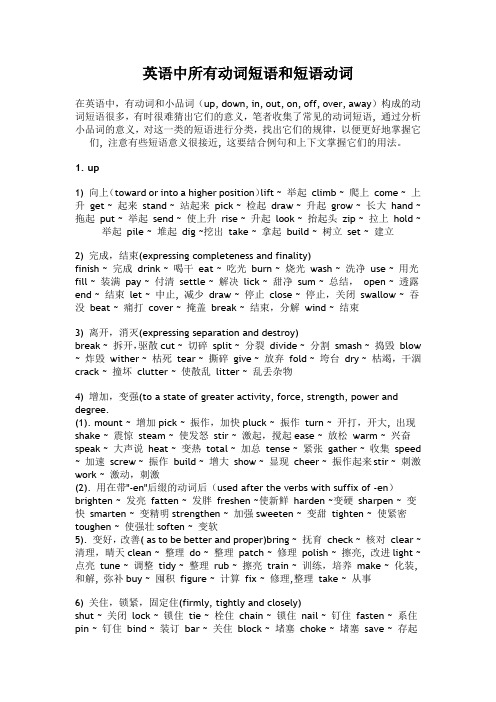
英语中所有动词短语和短语动词在英语中,有动词和小品词(up, down, in, out, on, off, over, away)构成的动词短语很多,有时很难猜出它们的意义,笔者收集了常见的动词短语, 通过分析小品词的意义,对这一类的短语进行分类,找出它们的规律,以便更好地掌握它们, 注意有些短语意义很接近, 这要结合例句和上下文掌握它们的用法。
1. up1) 向上(toward or into a higher position)lift ~ 举起climb ~ 爬上come ~ 上升get ~ 起来stand ~ 站起来pick ~ 检起draw ~ 升起grow ~ 长大hand ~ 拖起put ~ 举起send ~ 使上升rise ~ 升起look ~ 抬起头zip ~ 拉上hold ~ 举起pile ~ 堆起dig ~挖出take ~ 拿起build ~ 树立set ~ 建立2) 完成,结束(expressing completeness and finality)finish ~ 完成drink ~ 喝干eat ~ 吃光burn ~ 烧光wash ~ 洗净use ~ 用光fill ~ 装满pay ~ 付清settle ~ 解决lick ~ 甜净sum ~ 总结,open ~ 透露end ~ 结束let ~ 中止, 减少draw ~ 停止close ~ 停止,关闭swallow ~ 吞没beat ~ 痛打cover ~ 掩盖break ~ 结束,分解wind ~ 结束3) 离开,消灭(expressing separation and destroy)break ~ 拆开,驱散cut ~ 切碎split ~ 分裂divide ~ 分割smash ~ 捣毁blow ~ 炸毁wither ~ 枯死tear ~ 撕碎give ~ 放弃fold ~ 垮台dry ~ 枯竭,干涸crack ~ 撞坏clutter ~ 使散乱litter ~ 乱丢杂物4) 增加,变强(to a state of greater activity, force, strength, power and degree.(1). mount ~ 增加pick ~ 振作,加快pluck ~ 振作turn ~ 开打,开大, 出现shake ~ 震惊steam ~ 使发怒stir ~ 激起,搅起ease ~ 放松warm ~ 兴奋speak ~ 大声说heat ~ 变热total ~ 加总tense ~ 紧张gather ~ 收集speed ~ 加速screw ~ 振作build ~ 增大show ~ 显现cheer ~ 振作起来stir ~ 刺激work ~ 激动,刺激(2). 用在带"-en"后缀的动词后(used after the verbs with suffix of -en)brighten ~ 发亮fatten ~ 发胖freshen ~使新鲜harden ~变硬sharpen ~ 变快smarten ~ 变精明strengthen ~ 加强sweeten ~ 变甜tighten ~ 使紧密toughen ~ 使强壮soften ~ 变软5). 变好,改善( as to be better and proper)bring ~ 抚育check ~ 核对clear ~ 清理,晴天clean ~ 整理do ~ 整理patch ~ 修理polish ~ 擦亮, 改进light ~ 点亮tune ~ 调整tidy ~ 整理rub ~ 擦亮train ~ 训练,培养make ~ 化装, 和解, 弥补buy ~ 囤积figure ~ 计算fix ~ 修理,整理take ~ 从事6) 关住,锁紧,固定住(firmly, tightly and closely)shut ~ 关闭lock ~ 锁住tie ~ 栓住chain ~ 锁住nail ~ 钉住fasten ~ 系住pin ~ 钉住bind ~ 装订bar ~ 关住block ~ 堵塞choke ~ 堵塞save ~ 存起来store ~ 贮藏stock ~ 储存cover ~ 掩盖wrap ~ 包住lay ~ 储存hold ~ 延误keep ~ 坚持7) 向说话人的方向(to the place where the speaker is)go ~ run ~ rush ~ drive ~ walk ~ catch ~ swim ~ march ~ come ~2. down1) 向下的位置(to or into a lower position)cast ~ 扔下cut ~砍倒get ~ 下来hand ~ 传下来knock ~ 撞倒lay ~ 放下let ~ 放下pour ~ 倾盆而下pull ~ 拉下set ~ 放下sit ~ 坐下step ~ 走下来throw ~ 扔下turn ~ 拆下take ~ 取下blow ~ 吹倒bring ~ 打倒hang ~ 垂下sink ~ 沉落slip ~ 失足squat ~ 蹲下swallow ~ 吞下stoop ~ 伏身splash ~ 飞溅而下touch ~ 降落bend ~ 弯下bow ~ 鞠躬kneel ~ 跪下lie ~ 躺下strip ~ 脱下2) 减少(强度,量和体积)(a decrease in intensity, amount, bulk)dwindle ~ 减少die ~ 变弱,逐渐停止go ~ 平静下来mark ~ 削减hold ~ 压低burn ~ (火)减弱, 烧坏slow ~ 慢下来burn ~ 烧掉wash ~ 冲淡clean ~ 弄干净rub ~ 擦干净bring ~ 降低keep ~ 缩减trim ~ 裁减water ~ 冲淡thin ~ 减少run ~ 用光衰弱wear ~ 削减,磨损come ~ 下跌knock ~ 降价3) 停止,减弱(to a state of less activity, force, strength and power)close ~ 关闭drop ~ 突然停止break ~ 坏了,中止run ~ 停止settle ~ 平静下来cool ~ 冷静下来turn ~ 拒绝die ~ 停止lay ~ 失望put ~ 镇压4) 紧紧地,牢牢地(firmly, tightly) fasten ~ 系牢chain ~ 链住,栓住clamp ~ 夹住nail ~ 钉住pin ~ 扣牢hammer ~ 钉上tie ~ 栓住bind ~ 捆绑draw ~ 停下来5) 写下,记下(on paper or in writing) write ~ 写下copy ~ 抄下note ~ 记下take ~ 记下put ~ 记下get ~ 记下have ~ 写下3 on1) 继续(continuously)carry ~ drive ~ fight ~ hold ~ keep ~ live ~ sleep ~ sing ~ walk ~ go ~ hurry ~ move ~ read ~ follow ~ struggle ~ insist ~ 坚持2) 连上,固定住,(in or into a state of being connected)act ~ 对…起作用catch ~ 抓牢come ~ 跟随count ~ 依赖draw ~ 带上,穿上fasten ~ 纠缠,抓牢fit ~ 固定get ~ 接近paste ~ 粘住turn ~ 打开switch ~ 打开pin ~ 钉住put ~ 穿上try ~ 试穿pull ~ 穿上hang ~ 不挂断build ~ 建立于leave ~ 留住take ~ 穿下rely ~ 依靠depend ~ 依靠3) 向前,向上(forward, onward)add ~ 加上mark ~ 标上paint ~ 漆上press ~ 向前pass ~ 传递send ~ 转送stamp ~ 盖章于get ~ 上车hand ~ 传送4) 开始某活动(in or into an active operation)work ~ 从事fall ~ 攻击hit ~ 突然向起bring ~ 引起get ~ 取得进展look ~ 旁观, 观看call ~ 拜访figure ~ 打算,希望fix ~ 决心get ~ 进步, 友好相处pick ~ 批评plan ~ 打算decide ~ 决定reflect ~ 思考, 反思remark ~ 评论,议论settle ~ 决定spur ~ 鼓励urge ~ 督促4. off1) 离开(indicating departure)blow ~ 吹掉drive ~ 击退get ~ 下车,动身lift ~ 离开地面make ~ 逃走move ~ 离去pack ~ 打发走see ~ 送行ship ~ 运往start ~ 动身send ~ 送行,解雇call ~ 叫走let ~ 放出take ~ 起飞touch ~ 发射give ~ 发出clear ~ 走开carry ~ 夺走2) 去掉,断开(indicating removal or disconnection)cut ~ 切断tear ~ 扯掉take ~ 拿走chip ~ 切下come ~ 脱落cross ~ 除去drop ~ 跌落fall ~ 脱落flick ~ 弹掉peel ~ 剥掉pull ~ 撕开rub ~ 擦掉scrape ~ 挂去shave ~ 剃去wash ~ 洗掉shake ~ 抖落throw ~ 扔开rip ~ 扯开turn ~ 关掉strip ~ 脱去switch ~ 关掉take ~ 脱掉shut ~ 关掉wear ~ 磨损go ~ 爆炸break ~ 中断3) 完成,停止(indicating completion)finish ~ 结束pay ~ 付清break ~ 停止,中断send ~ 结束leave ~ 停止pass ~ 终止,停止sign ~ 停止播音wear ~ 消失,write ~ 注销,购销bring ~ 完成call ~ 取消lay ~ 停止, 解雇4) 着地(down to the ground)fall ~ 落下jump ~ 跳下knock ~ 击倒slip ~ 滑倒5. in1) 进入,向里(into, inside, indoors)barge ~ 闯入beat ~ 打进break ~ 闯入,插嘴breathe ~ 吸入burst ~ 闯入,打断drop ~ 偶然拜访fall ~ 跌入get ~ 插入,收进knock ~ 打入lead ~ 导入let ~ 进入,嵌入move ~ 迁入step ~ 走进settle ~ 迁入smuggle ~ 偷偷运进cut ~ 插嘴call ~ 来访draw ~ (火车)进站intervene ~ 介入involve ~ 卷入2) 包围,关闭(to be surrounded, or enclosed)close ~ 包围,封闭lock ~ 禁闭shut ~ 关进wall ~ 围住3) 加入,记入(to be added, or included)book ~ 登记check ~ 签到count ~ 记入fill ~ 填入hand ~ 交上take ~ 吸收send ~ 呈交6. out1) 向外(away from the inside, outside)keep ~ 使在外take ~ 拿出put ~ 放出,伸出come ~ 长出,bring ~拿出bar ~关在外breathe ~ 呼吸出eat ~ 出去吃get ~ 弄出go ~ 出去lay ~ 摆开,展示lock ~ 关在外面look ~ 向外看move ~ 搬出point ~指出pour ~ 诉说pull ~ 拉出ship ~ 运出stick ~伸出spit ~ 吐出beat ~ 敲出knock ~ 敲出dine ~ 外出吃饭drive ~ 驾车外出leak ~ 漏出draw ~ 拉出see ~ 送出门去draw ~ 出站let ~ 放出, 释放2) 结束,消失,取消(to or at an end, not to be there or not to exist)burn ~ 烧尽,烧断clear ~ 清除dust ~ 清除fade ~ 消失put ~ 扑灭run ~ 用完use ~ 耗尽give ~ 耗尽comb ~ 淘汰kick ~ 逐出wipe ~ 消灭die ~ 灭绝rub ~ 擦掉blot ~ 除去blow ~ 吹熄bleach ~ 漂白carry ~ 完成,执行leave ~ 省去see ~ 完成go ~ 熄灭come ~ 罢工,结果cut ~ 删去,停止hold ~ 坚持到底sell ~ 买完tire ~ 筋疲力尽wear ~ 磨损3) 大声(in a loud voice, aloud)sing ~ cry ~ shout ~ call ~ ,喊,申斥spell ~ speak ~ scream ~ read ~ yell ~ sob ~ burst ~ 咆哮4) 分发,传开(to a number of people or in all directions)give ~ 分发spread ~ 传开set ~ 出发hand ~ 分发share ~ 分配divide ~ 分配call ~ 出动start ~ 出发send ~ 发送break ~ 爆发,逃脱serve ~ 分发口粮drop ~ 离开,退出5) 搞清,弄明白(in or into notice and clearness)find ~ 找出figure ~ 算出,解决make ~ 弄清count ~ 点清come ~ 出版,出现catch ~ 看出carry ~ 完成,bear ~ 证明bring ~ 发表,说出fill ~ 使完全, 添满write ~ 写出7. over1) 向下(downwards from an upright position)knock ~ 撞倒turn ~ 翻转fall ~ 脸朝下跌倒trip ~ 拌倒bend ~ 伏身look ~ 从…上面看2) 自始至终,通过, 重复(from beginning to end, through, again and again) look ~ 调查think ~ 考虑see ~ 查看run ~ 匆匆看talk ~ 商量call ~ 点名read ~ 读一遍go ~ 复习do ~ 重复glance ~ 浏览skip ~ 略过ponder ~ 思考3) 向上,向外,(indicating motion upwards or outwards)run ~ 溢出spill ~ 溢出boil ~ 因沸溢出throw ~ 呕吐所有短语动词look out (for)小心watch out (for)小心wear(sb)out 使疲劳;劳累leave out 省去;遗漏;忽略work out(well)很成功;结果是好的turn out 生产;证明是put out 扑灭;生产;出版;赶走take out 拿出pull out 拉出;掏出;拔出;抽出;取出;(车,船)驶出pick out 选出;领会;弄明白pay out 付出;得到报应make out 看清;理解;断定keep out 把…挡在外边hold out 伸出;支撑;提出hand out 分发;施舍go out (灯、火)熄灭;(年、月)结束;(衣着)过时;倒塌;罢工carry out (the plan / the policy)实施;执行break out 爆发give out 发出(气味、热)等;分发;耗尽;疲劳check out 结账离开call out 大声叫喊drop out 辍学;掉落come out 出来;花开放;出版;得…名次get out (使)出去;逃脱;(消息等)泄露;说出;公布think out 想出let out 泄漏(机密);发出(喊叫)point out 指出blow up 告吹;发脾气;(风雨)等发生break up 破碎;结束;(士气)衰弱;(关系)破裂bring up 培养;养育;呕吐call up 给…打电话;使人想起come up 走近;发芽;提出来;出现(问题;建议);上楼cover up 掩盖;包庇cut up 切碎;使…难过get up 起床;起立;(风、浪、火)大起来;打扮;安排;组织check up=check through=check over 核对;检查give up 放弃;把…送交;使埋头于…go up 上升;涨价;修建;增长hang up / off 挂起;挂断电话hold up 举起;竖起;支撑;使停顿;使延误keep up 保持;继续(某活动)look up 抬头看;查阅;看望;(身体)好转make up 弥补;赔偿;编造;组成;虚构pull up 拔出;拔掉;使车停住;停车pick up 举起;拾起;(身体)好转;中途接入;(非正式)学会;偶然发现/买到/得知/养成习惯等wind up 上紧(钟表)发条;使紧张;兴奋;结束put up 举起;盖起;支起;张贴;投宿shut up 关门;关在里面;闭嘴show up=turn up 露面take up 着手;占有(时间,空间)turn up 出现;放大(灯光,收音机,煤气等)work up 激发(情感)wrap up 席卷而去;包起来think up 想出use up 用完make up 化妆;编造save up 节省eat up 吃光stay up / sit up 熬夜不睡觉light up 照亮;(脸上)呈现高兴的情绪look up 抬头看;查找;好转blow off 吹掉;埋怨;炸掉break off 突然中断;停止;与…断绝关系call off 叫走;取消carry off 夺走;抢走;获得奖品;叼走come off 脱落;举行;结果cut off 切下;剪下;切断cross off/out 勾掉;划掉die off 相继死去fall off 跌落;减少;脱落;衰退knock off 撞落;撞倒get off 下来;下车;脱下(衣服);(飞机)起飞give off 发出;放出go off (to…)熄灭;动身去某地;炸锅hang off / back 忧郁;畏缩hold off 推迟;抵挡;不使…接近keep off 避开;防止;挡住leave off 停止;中断pay off 还清;偿还掉put off 推迟;延期shut off 关掉;切断电源take off 脱下;起飞turn off 关掉;切断;取消wipe off 擦掉;还清(债务)blow down 吹倒;吹落break down 出故障;失败;崩溃;分解bring down 使下降;使泄气come down 下来;下降cut down 减少开支;砍倒die down (风、雨、火、植物,浪)平息fall down 落下;跌到;倒塌;失败;证明是不行的go down (价格)下降;(日、月)落下;(风、浪)平静;(船)下沉;倒闭hand down 递给;传递下来;世代相传hold down 制止;控制;缩减put down 写下;记下;镇压;放下shut down (指工厂)关闭;停工take down 记下来;取下来;拆除;咽下turn down 拒绝;关小;调低let sb down 使… 失望bring about 导致;产生;发生come about 产生;造成hang about/around 闲逛;逗留;徘徊check over 核对;检查come over 走过来take over 接管;接替;继承think over 仔细考虑;思考一下turn over 翻开;翻身;移交go over 越过;细看;复习;转向;被翻倒get over 爬过(山、墙);克服(困难、偏见)熬过;从…恢复过来;做完;浏览look over one‘s shoulder 看过去roll over 翻滚;翻身fall over 绊了一跤take away 拿走get away (from)逃脱;离开;出发;把…送走;寄走blow away 吹走;吹散break away from 脱离(政党)等;放弃;打破(陈规)carry away 运走;使失去自制力die away (风、声音)减弱give away 分发;赠送;出卖;放弃(机会)等go away 走开;离去;(岁月)流逝;死去keep away from… 使避开;使远离pass away 去世;消失;度过put away 把…收起来;存好;放置暂时不用run away 逃走;携带…逃走fade away 褪色;慢慢褪去wash away 洗掉;(洪水)冲垮stay away from 离… 远点shy away from 退出;躲避bring back 拿回;使…回想起call back / ring back 回电话turn back 回来get back 回来;恢复;要回;带回fight back 反击put back 放回原处;拨回时钟;延期推迟take back 收回kick back 踢回pay back 偿还write back 回信give back 归还;送回;恢复;后退come back to life 恢复健康look back on… 回忆;回顾throw back 扔回去draw back 后退其他常用词组(to为介词)object to 反对attend to 办理;处理;注意听;照顾look forward to 期待;盼望be opposed to 反对devote… to 贡献给…stick to 坚持lead to 导致pay attention to 注意到be related to 与…有关be limited to 限制到…be applied to 应用于…see to 注意做到;务必做到;负责… refer to 提到;指的是turn to 翻到;求助于。
英语语法动词和动词短语

咽下;写下;使沮丧,使抑郁
get down to 认真对待,静下心来
get familiar with 熟悉
get hold of 获得,取得
get home
到家
get in get off get on get upon with get one’s hand in get out of get over get ready for get rid of
公平对待某人
do some cleaning (v.+ing,etc.) 搞卫生
do sb. a favor
帮助某人
do well in
学得不错,干得漂亮
do with do without do wonders have much to do with have nothing to do with have something to do with in doing so=in so doing That will do.
look after
照顾,看管
look around 东张西望
look at
注视,着眼于
look back
回顾
look for
寻找;期待,期望
look down on 俯视;轻视
look forward to 盼望,期待
look into look like look on look out look over look through look up to
make使成为
C.可跟带to不定式结构作宾补的动词有:
advise,allow,ask,expect,get,invite,order,tell,teach,wish,
warn,want等。
英语的短语动词与动词短语有何区别

英语的短语动词与动词短语有何区别一、短语动词短语动词由动词加上介词或副词小品词构成。
比如:1. 由动词break构成的常见短语动词有:break away (from) 突然逃离;断绝往来,脱离;改掉,破除break down (机器等)坏了;(计划等)失败;(谈话等)中断;(健康等)变坏;感情失去控制break in 突然进来,强行进入;插嘴,打岔;训练,使适应break into 强行进入;突然…起来;打断,插嘴;占用时间break off 停止讲话;暂停,休息;(使)折断break out (火灾、战争等)突然发生,爆发break through 突破;克服,征服;强行穿过;(太阳等)从云层里出来break up 解散,驱散;(学校等)放假;结束,破裂;击碎;绝交break with 与…绝交,与…决裂2. 又如由bring构成的常用短语动词有:bring about 引起,实现,导致bring (a)round 使改变观点或看法;使苏醒;顺便把某人带来串门bring back 送还;使想起,使恢复bring down 击落;打死,打伤;使倒下;降低bring forth 产生,引起,结果bring in 收获;获利;介绍,引进;聘请;逮捕bring off 从船上救出;设法做成bring on 带来,引起;促使生长;帮助提高bring out 取出,拿出;显示出,使出来;出版bring over 说服,使改变(思想等)bring through 使度过(困难,危机等)bring together 使和解bring up 提出,提起;抚养,培养;呕吐这样的例子很多,欲需更详细的资料,可参考一本好的语法书,或上“英语语法网”查阅相关信息。
二、动词短语动词短语由动词加上宾语或状语构成。
如:break a glass 打破一个玻璃杯break one’s leg 摔断腿break a window 打破窗户break the rules 违反规定break a bad habit 改掉坏习惯break the world record 打破世界记录bread easily 容易断break to pieces 破成碎片bring a book 带来一本书bring sb sth 给某人带来某物bring sb great satisfaction 给某人带来极大的快慰bring death and famine 导致死亡和饥荒。
动词及动词短语

动词及动词短语概述动词(verb)一般就是用来表示动作或状态的词。
动词一般在句中担任谓语的成分一实意动词:能独立做谓语的动词就是实意动词。
主要包括及物动词和不及物动词。
1.及物动词—Transitive Verb (vt)本身意义不完整,需要接宾语才能使其意义完整。
seat , injure ,accept , finish , cover, defeat, put, give, post, sell, buy ,consider, advise, hear…..例句:It is hard to change ourselves.2.不及物动词—Intransitive Verb(vi)本身意义完整,不需要接宾语,如需加宾语,通常先加介词再加宾语。
Listen, look,Come , go , arrive , sit , swim, cry, stand , run ,fail, happen, take place, break out , occur, come true,exist…改错:1)Look the blackboard! 2)I like listening music. 3)3.系动词:连接主语和表语的动词。
特点:它本身有词义,但不能单独做谓语,后面须跟表语一起构成复合谓语。
表示主语的身份(I am a teacher.),类别(It is a book),特征(She is beautiful)和状态( The door is open)等。
分三类:1)表示一个特征或状态:be , taste, look , feel , sound, seem, appearHe looks very happy. The food tastes delicious2)表示变成某种状态:make , turn , get, come , grow, run , prove , become ,turn out , goThe leaves turn yellow in autumn.It becomes colder and colder3)表示保持某种状态:keep, remain , continue, lie ,stayStaycalm when you are in danger.当你处于危险的时候保持冷静。
重要知识点解析短语动词与动词短语的区别与运用

重要知识点解析短语动词与动词短语的区别与运用短语动词和动词短语是英语中常见的语法结构,它们在句子中起到动词的作用。
然而,虽然它们在结构上很相似,但它们在意义和用法上存在一些差异。
本文将详细解析短语动词和动词短语的区别,并探讨它们的运用。
一、短语动词短语动词是由一个动词和一个或多个小品词(副词、介词等)组成的固定搭配,其整体意义不等于单独的动词和小品词的意义之和。
短语动词通常有两种形式:及物短语动词和不及物短语动词。
1. 及物短语动词及物短语动词需要带一个宾语才能构成完整的句子,宾语一般位于短语动词的后面。
例如:- take off: 脱掉She took off her coat before entering the room.(她在进屋之前脱下了外套。
)- bring up: 抚养My grandparents brought me up after my parents passed away.(父母去世后,是爷爷奶奶抚养了我。
)2. 不及物短语动词不及物短语动词不需要宾语,可以单独构成句子。
例如:- give up: 放弃Don't give up when faced with difficulties.(面对困难时不要放弃。
)- run away: 离家出走The little boy ran away from home because he didn't like the strict rules.(小男孩因为不喜欢严格的规定而离家出走。
)二、动词短语动词短语是由一个动词和其后的一个或多个成分(名词、形容词、副词等)构成的短语结构。
动词短语在句子中充当动词的成分,起到修饰名词或形容词的作用。
1. 动词短语修饰名词当动词短语用来修饰名词时,通常位于名词的前面。
例如:- a running river: 一条奔流的河流The running river reflects the beauty of nature.(奔流的河流映照着大自然的美丽。
高中英语《动词和动词短语》语法及听力课注意事项

高中英语《动词和动词短语》语法及听力课注意事项考向一常用动词辨析1.advise ,persuade,suggestadvise用作及物动词,表示"劝告,忠告,建议",强调提醒或引起注意;persuade表示"说服",强调劝说成功,主要搭配是:persuade sb.to do sth. 说服某人做某事(相当于persuade sb.into doing sth. );如表示劝说但不一定成功,则使用try to persuade sb.todo sth. 或advise sb.to do sth.。
suggest用作及物动词,意为"建议",后接名词、代词、动名词或从句,从句中的谓语用"should +动词原形",should可以省略。
2 .bring,take,carry,fetchbring "带来,拿来,取来",强调从别处带人或物到说话人所在地。
take"拿走,带走",强调把人或物从说话者身边带走,方向与bring 相反。
fetch"去拿来,去取来",强调从甲地出发到乙地取物或人后,又回到甲地,相当于go and bring 。
carry"携带,搬运,运送",强调用人力或车辆把人或物从一地运到另一地。
3 .win,beat,defeatwin表示"赢得,战胜"时,宾语多是比赛项目等。
win sb. 则指"赢得人心"。
beat/defeat意为"打败,击败",其宾语只能是人或由人组成的机构。
如:beat sb. 打败某人;defeattheir team/ the country/the enemy 击败了他们的队/国家/敌人。
beat多用于表示在比赛或争论中战胜对手;defeat多用于在战争中打败对手。
4 .believe,believe inbelieve表示"相信,认为",侧重于相信某人说的话或所做事情的真实性,其后可跟名词、代词、不定式的复合结构或宾语从句。
believe in表示"相信,信任,信仰,信奉",其后常接真理、宗教、原则之类的名词。
- 1、下载文档前请自行甄别文档内容的完整性,平台不提供额外的编辑、内容补充、找答案等附加服务。
- 2、"仅部分预览"的文档,不可在线预览部分如存在完整性等问题,可反馈申请退款(可完整预览的文档不适用该条件!)。
- 3、如文档侵犯您的权益,请联系客服反馈,我们会尽快为您处理(人工客服工作时间:9:00-18:30)。
短语动词和动词短语
一。
动词短语
动词短语的搭配可分为下列六种基本类型。
1.动词+副词
1)作及物动词,例:
He brought up his children strictly.
从以上的例句中可以看出,在“动词+副词”的词组中宾语位置有两种情况:宾语如是名词,
则可置于副词后面,亦可置于动词和副词之间。
而如果宾语是代词,只能置于动词后面,即
动词和副词之间。
2)作不及物动词,例:
Something unexpected has turned up.
出现了令人意外的情况。
(turn up=appear)
3)既可作及物动词又可作不及物动词,例:
The barrel of gunpowder blew up.(不及物)火药桶爆炸了。
The soldiers blew up the bridge.(及物)士兵们把桥炸毁了。
2.动词+介词
动词与介词构成的词组在词义上相当于一个及物动词,宾语总是在介词后面,例:
I don’t much care for television.我不很喜欢电视。
(care for=like)
3.动词+副词+介词
在这类动词短语中,动词、副词、介词紧密结合,是动副词组和动介词组的合成体,词义上
相当于一个及物动词。
它兼有以上两类短语动词的特点,但宾语总是位于介词之后,例:
We must work hard to make up for lost time.我们必须努力工作来弥补失去的时间。
(make up for=
compensate)
4.动词+名词
这类动词短语中的常见动词是have,take,give,make等,后面的名词通常是从动词转化
而来的动作名词,并表达了短语动词的真正意义,例:
Let’s have another try.让我们再试一下。
(have a try=v.try)
5.动词+名词+介词
这类动词短语只用作及物动词。
名词前可加形容词说明程度,宾语总是位于介词之后,例:
Keep an eye on the baby while I am out.我不在家时请照看一下小孩子。
6.be+形容词(包括过去分词作形容词)+介词
这类动词短语也相当于及物动词,宾语位于介词后面,形容词是短语动词的真正词义,例:
I know he is slow at understanding,but you have to be patient with him.我知道他理解力差,但你得对他耐心些。
二、短语动词
(1)短语动词常常是两个词(一个动词+一个副词性小品)构成,如:wake up , get up ,turn out 等。
(2)同一个动词后面可以有不同的副词性小品词,构成不同意义的短语动词。
如:He turn on the radio .Bob turned out smiling.。
